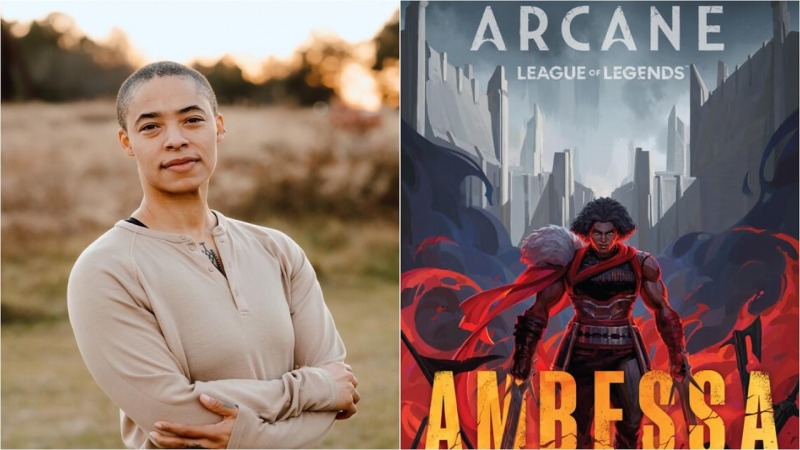C.L. Clark Talks Bringing Ambessa to Life in Prose
Photo: Meg White
Unless you’ve been sleeping under a rock, you’ve heard about the fantastic League of Legends-inspired animated series, Arcane. Notable for being the most expensive animated television series ever made, Arcane has garnered fans among reviewers and viewers alike, with Paste’s own headlines declaring the show “spellbinding” and “stunning.”
But even if you have been under a rock, you should still pick up Ambessa: Chosen of the Wolf. This prequel novel to Arcane centers on the title character, Ambessa, a complicated figure whose decisions impact the entire series. Readers who know nothing more about the show can dive into the world blindly, not knowing who to root for, or where they might end up. Who are the heroes and villains of the saga—and what’s the right outcome? Fans who already know where this book takes its characters will be thrilled to see how they got there, and new readers will be kept guessing, watching Ambessa’s journey toward claiming the position she believes is rightfully hers—and revealing what sacrifices she’s willing to make to get what she wants.
It’s fitting that C.L. Clark, an author known for ambiguous protagonists who are not wholly heroes or villains (and frequently end up tangled in each other’s sheets) was brought on board to write Ambessa’s story. Like Clark’s Magic of the Lost series, Clark provides close point-of-view scenes from several characters, never shying away from their flaws and always presenting their perspectives in a way that asks readers to dig in deeper. Clark also practices swordplay, and her action scenes in Ambessa: Chosen of the Wolf reflect that personal experience with fight choreography (while keeping nods to the source material in the styles).
We had the chance to chat with Clark about what it was like to work on this beloved IP, her own history with League of Legends, and what’s coming next from the author.
![]()
Paste Magazine: What a saga you’ve taken readers on in Ambessa! I came into Arcane with this novel as my first introduction, and it was fascinating for me, not knowing where the characters would end up at the end—which meant I didn’t know who I should root for. You’re really well known for writing fantasy novels with complex protagonists, all with their own motivations and justifications for their actions, and you’ve brought that to the fore here. How much of Ambessa’s own validation for her actions did you need to invent? How much was present in the materials you were given?
C.L. Clark: From the beginning, we knew we wanted a story that didn’t try to soften Ambessa’s edges. We wanted her to stay the powerful, more than slightly terrifying warlord who didn’t care what or who she stepped on if it got her what she wanted. The Noxian pillars of Might, Vision, and Guile and her bonus, Sacrifice, were a part of her from the beginning. We also knew family was a prime motivator, as well as power over her house. All of that was part of the notes, and honestly, it was what attracted me to the project in the first place—how much she was already like the characters I love writing. My primary contributions were in the precise nature of the scenes depicted and how certain conflicts or scenarios would come about.
Paste: By the end of the novel, it becomes harder and harder to believe in Ambessa’s own justifications, especially as she pushes off any internal doubts that she might be mistaken, that she might have regrets. Do you view Ambessa as a villain, or an anti-hero, or something completely different?
Clark: Well, she’s definitely not standing on a moral high ground if your values are kindness and austerity. She sees herself very much as a hero, and I think she does have qualities we often find heroic: physical strength and martial skill, intelligence and strategy, love for family. She just also happens to have a higher loyalty to herself and a certain vision. And that’s not so different from most of us. I think she becomes a very different person from Book!Ambessa to Arcane!Ambessa, though, and her desperation turns her even more ruthless, more villainous. She’s clearly the narrative villain in Arcane Season 2, and it was really fun to develop where she started as a person who would become the Ambessa we see in Arcane.
But in the broader scope, I think conversations about who is a villain and who is not can often water down the conversations we could be having about character nuance—this is something I see a lot around Caitlyn’s character, as well. There are reasons we admire characters who do bad things, whose morals we might not align with—and also bad things that do align with our morals. And it’s worth looking at why that might be. Unfortunately, I think a lot of folks take a very simplistic view, and when they see the word “villain,” they assume they can’t have anything in common with them. In fact, as you mention above—that’s the very reason I like complex protagonists whose choices are complicated and sometimes…ill-advised. Maybe even cruel. I am also ill-advised. And sometimes even cruel. It’s important to acknowledge these parts of ourselves.
Paste: The combat you’ve written in other novels is very grounded in reality, whereas the combat in Arcane is inspired by video game mechanics and physics. Ambessa’s drakehound gauntlets feel both practical and fantastic—I don’t think they could exist in the real world! How did you determine how to write her combat scenes with those weapons?
-

-

-

-

-

-

-

-

-

-

-

-

-

-

-

-

-

-

-

-

-

-

-

-

-

-

-

-

-

-

-

-

-

-

-

-

-

-

-

-








































